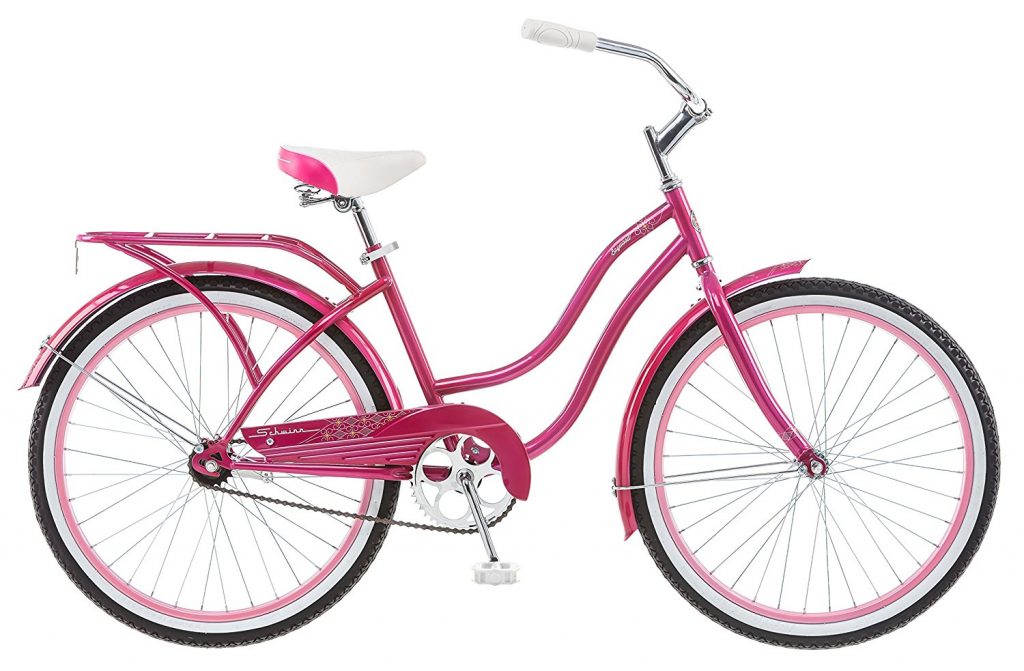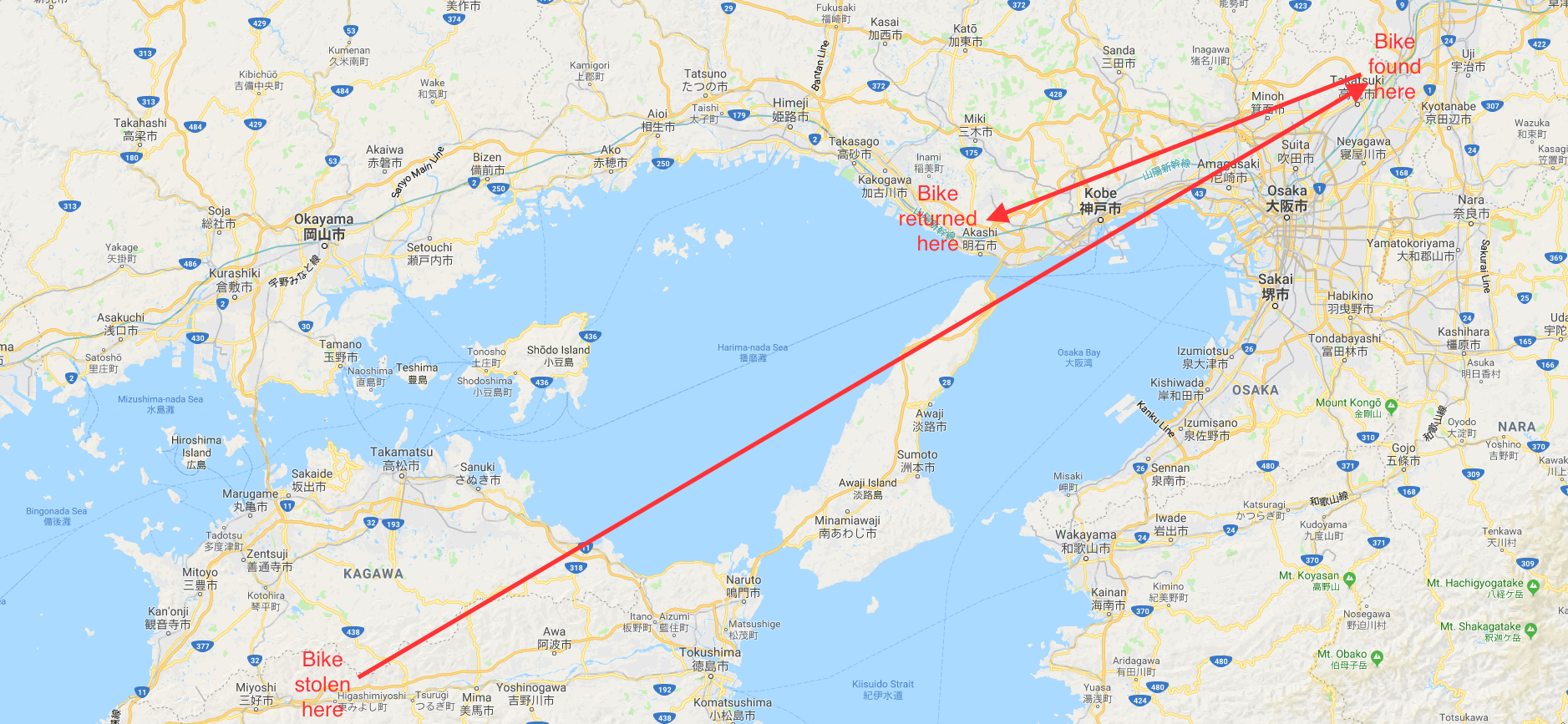 This is your basic girls bike here in Japan.
This is your basic girls bike here in Japan.
Yes, they sell Schwinn, an “American” bicycle, manufactured of course in China. But there is quite a selection based on this standard model. They cost between $50 and $150. The pictured one is pretty fancy. Pink adds at least $50 to the sale price.
I’m going to talk about something which recently happened here, not that far from where I live, maybe within four hours driving. I seriously doubt if the bike involved was anywhere near as high-end as the pink beauty pictured. But it certainly looked something like this, being a basic boilerplate ride-to-school-and-back bike. They’re ubiquitous here.
It’s EXTREMELY rare. But a girl who lived in Shikoku had her bike stolen.
She reported it to the police. Seriously . . . she did! That’s what you do in Japan.
It’s not as far-fetched as it sounds. All bikes must have a registration tag. A couple years back, I was riding my bike back from the grocery store and a young police officer on a motor scooter stopped me, looked at my tag, thanked me, and drove merrily away.
Anyway, a month later, the school girl got a call from a police department northeast of Osaka. They had found her bike, and wanted to get it back to her. The young lady was understandably very happy! She told the police that she had an aunt who lived in Akashi. If they could arrange to bring the bike there, she could pick it up.
The police welcomed the suggestion. They were much closer to Akashi than the little town the girl lived in on Shikoku Island.
Next day, they personally delivered the bike to the girl’s aunt in Akashi, a trip which took nearly two hours each way, a total of almost four hours of their valuable police time.
I want to put this in perspective, especially the distances involved. Here’s a map.

Mind you, while Shikoku is sparsely populated, the entire area around Osaka is quite congested. Two hours is not excessive, considering traffic, having to locate the aunt’s residence, etc. And to return it to the girl’s home town would have been close to four hours each way.
The most significant point is that the bike turned up 219 km (136 miles by car) from where it was stolen. The police officers at this distant location tracked down the owner via the ID tag, and personally made sure the bike got back to her.
I don’t know if this is blowing your mind or not. I’ve lived here on and off for over ten years and this type of thing still leaves me slack-jawed.
Granted, in a small town like Elizaville, Indiana or Wanblee, South Dakota, I can imagine someone telling the sheriff about a stolen bike. But for most Americans — over 80% live in urban areas — the thought of going to the police about a stolen bike seems absurd.
“You want to report a what? Listen, buster. While you’ve been standing here teary-eyed, telling me about your $50 bike, we’ve had two shootings, three car jackings, some bozo dressed like Michael Jackson jumped off a bridge singing ‘Beat It’, and there’s a 152-car traffic pile-up on the freeway because some idiot at the Department of Transportation posted a warning on all the traffic advisory signs that there was a missile carrying a hydrogen bomb incoming from North Korea. Get a job and buy a new bike, loser!”
It’s obvious, priorities are different here in Japan. We’re not in a constant frenzy, in a constant state of paranoia, convinced there are terrorists lurking in every doorway and child molesters hanging out by the monkey bars at every city park, suspicious of every individual who isn’t suspicious of everyone else because obviously this person is out of touch with reality and a clear danger to the community. People here aren’t armed to the teeth, such that everyone’s worried about a mass shooting, or that a minor disagreement about a parking space will result in the barrel of an AR-15 being shoved down our throat.
But it goes even deeper than that. There’s an innocence here, and a sense of honor and courtesy, a respect for the possessions of others. So much so that a bicycle theft is truly out-of-the-ordinary. And thus it warrants extraordinary response by the authorities.
No country is perfect. Japan has many issues as well. There is still a difficult struggle with its past, its military aggression and savagery. There is racism. There is a bit of arrogance, a condescending attitude toward other Asian countries. There is — in my opinion — a mindless, unnecessary obeisance to the U.S. in military and diplomatic matters, and a puzzling infatuation with Western culture, especially American pop culture.
No country is perfect. But some are certainly far superior than others.
I take great comfort in knowing . . . I don’t have to worry about my bike.




Life In Japan: Bicycle Theft
Yes, they sell Schwinn, an “American” bicycle, manufactured of course in China. But there is quite a selection based on this standard model. They cost between $50 and $150. The pictured one is pretty fancy. Pink adds at least $50 to the sale price.
I’m going to talk about something which recently happened here, not that far from where I live, maybe within four hours driving. I seriously doubt if the bike involved was anywhere near as high-end as the pink beauty pictured. But it certainly looked something like this, being a basic boilerplate ride-to-school-and-back bike. They’re ubiquitous here.
It’s EXTREMELY rare. But a girl who lived in Shikoku had her bike stolen.
She reported it to the police. Seriously . . . she did! That’s what you do in Japan.
It’s not as far-fetched as it sounds. All bikes must have a registration tag. A couple years back, I was riding my bike back from the grocery store and a young police officer on a motor scooter stopped me, looked at my tag, thanked me, and drove merrily away.
Anyway, a month later, the school girl got a call from a police department northeast of Osaka. They had found her bike, and wanted to get it back to her. The young lady was understandably very happy! She told the police that she had an aunt who lived in Akashi. If they could arrange to bring the bike there, she could pick it up.
The police welcomed the suggestion. They were much closer to Akashi than the little town the girl lived in on Shikoku Island.
Next day, they personally delivered the bike to the girl’s aunt in Akashi, a trip which took nearly two hours each way, a total of almost four hours of their valuable police time.
I want to put this in perspective, especially the distances involved. Here’s a map.
Mind you, while Shikoku is sparsely populated, the entire area around Osaka is quite congested. Two hours is not excessive, considering traffic, having to locate the aunt’s residence, etc. And to return it to the girl’s home town would have been close to four hours each way.
The most significant point is that the bike turned up 219 km (136 miles by car) from where it was stolen. The police officers at this distant location tracked down the owner via the ID tag, and personally made sure the bike got back to her.
I don’t know if this is blowing your mind or not. I’ve lived here on and off for over ten years and this type of thing still leaves me slack-jawed.
Granted, in a small town like Elizaville, Indiana or Wanblee, South Dakota, I can imagine someone telling the sheriff about a stolen bike. But for most Americans — over 80% live in urban areas — the thought of going to the police about a stolen bike seems absurd.
“You want to report a what? Listen, buster. While you’ve been standing here teary-eyed, telling me about your $50 bike, we’ve had two shootings, three car jackings, some bozo dressed like Michael Jackson jumped off a bridge singing ‘Beat It’, and there’s a 152-car traffic pile-up on the freeway because some idiot at the Department of Transportation posted a warning on all the traffic advisory signs that there was a missile carrying a hydrogen bomb incoming from North Korea. Get a job and buy a new bike, loser!”
It’s obvious, priorities are different here in Japan. We’re not in a constant frenzy, in a constant state of paranoia, convinced there are terrorists lurking in every doorway and child molesters hanging out by the monkey bars at every city park, suspicious of every individual who isn’t suspicious of everyone else because obviously this person is out of touch with reality and a clear danger to the community. People here aren’t armed to the teeth, such that everyone’s worried about a mass shooting, or that a minor disagreement about a parking space will result in the barrel of an AR-15 being shoved down our throat.
But it goes even deeper than that. There’s an innocence here, and a sense of honor and courtesy, a respect for the possessions of others. So much so that a bicycle theft is truly out-of-the-ordinary. And thus it warrants extraordinary response by the authorities.
No country is perfect. Japan has many issues as well. There is still a difficult struggle with its past, its military aggression and savagery. There is racism. There is a bit of arrogance, a condescending attitude toward other Asian countries. There is — in my opinion — a mindless, unnecessary obeisance to the U.S. in military and diplomatic matters, and a puzzling infatuation with Western culture, especially American pop culture.
No country is perfect. But some are certainly far superior than others.
I take great comfort in knowing . . . I don’t have to worry about my bike.